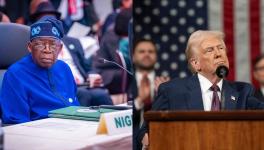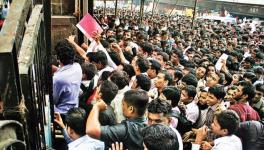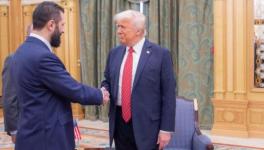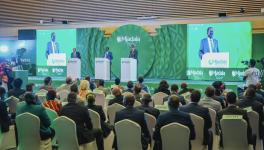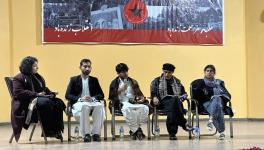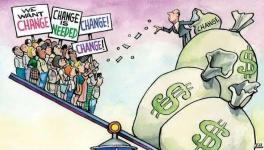Sri Lankan Crisis: A Chaos of Policies, Politics and Problems
Sri Lanka is witnessing its darkest days politically and economically as the President declared a public emergency across the country, following the public unrest against the leadership midst of the economic crisis that has crippled the Island.
Regardless of claims by the government that they are on the path to fixing the crisis, the recent announcement of the SL Rs 5000 relief packages with newly printed money or seeking continuous debts from all possible allies, including Bangladesh, China, and India, will not give any hope that the leadership is at least choosing the right path to economic recovery. Instead, it confirms and demonstrates the uncertainty and incapacity of those in power to fix the problems.
Unfortunately, the Island, known for its high human development indexes and claimed to be the top in the region for some of the well-implemented social welfare policies in health and education, has shocked the world with the current headlines. Sri Lanka's snowballing crisis may have resulted from the popular excuses the leadership endorses. Still, the underlying truth is that Sri Lanka's crisis is due to policy consequences of political corruption because policies implemented by corrupt leadership will always fail.
Despite several interventions by financial institutions, the Sri Lankan leadership has failed to address the systematic degradation of the economy. The post-war economy relied on high debts to increase exports and ambitious projects to build infrastructures to attract private investments but failed to achieve those ambitious goals due to the State's poor planning and inappropriate policy strategies.
When corruption was highest during the post-war Sri Lankan development, its people changed the Rajapaksha leadership. The new administration in 2015 had strategies for settling the high-interest loans, and they did manage to convert the short-term loans into cheaper, long-term debts and build up foreign reserves up to USD 7.5 billion. As a result, the Wickramasinga government achieved a budget surplus for the first time in 52 years. With the events that unfolded following the Easter bombings and COVID outbreak, Sri Lanka needed to maintain effective economic strategies to deal with the high debts and the Global crisis. Instead, the impact of the tragedies was used as an election strategy where Rajapakshas's gained power. Subsequently, effective development policies require adhering to certain policy processes in design and implementation. Sri Lanka's leadership failed or chose not to follow such ideal policy processes in handling the development amidst the global crisis. Therefore, blaming the pandemic and the war in Ukraine sounds too fancy.
The recent IMF recommendation to stabilise Sri Lanka's economy highlights the need to raise the income tax and value-added tax (VAT) rates while minimising exceptions. The fiscal deficit widened because, in the name of revising taxations, the newly elected government decreased 15% of the VAT in 2019, causing a loss of billions of rupees as tax revenue. Instead of diverting tax concessions toward economic relief for the general public, the tax reductions benefited many business dealers. Unfortunately, Rajapaksa's development strategy is highly dependent on massive debts. Sri Lanka's debt rose from 94% of GDP in 2019 to 119% in 2021.
While the foreign reserves were plunging and the import bills were costing too high with the rising global commodity prices, quixotic policies were implemented to reduce the import bills, which cost the country more than predicted. In response, the government banned imports of motor vehicles in 2020 and chemical fertiliser in 2021. The latter became the beginning of a massive blow to the already self-sufficient rice producer. Though the leadership boasted of organic farming, no proper studies were done to address the possible losses of this shift from chemical fertiliser to organic farming. Sri Lanka's rice production dropped by 20%, and it was forced to import rice worth $450 million as organic farm yields are significantly lower. Unfortunately, the policymakers missed simple theories such as when yields decrease, prices increase. As a result, the rice price increased by 50% in January 2022 and continues to date.
Despite the recommendations from economic experts, including the IMF, until March 2022, the Central bank resisted a devaluation of the Lankan Rupee and instead burned through foreign exchange reserves. Imports were thus impacted, resulting in a shortage of oil, cooking gas, medicine and certain essential food items. Inflation shoot-up and energy scarcity disrupted the country's power system, with up to 13 hours of power cut/day. In 2021, the World Bank survey confirmed that 44% of households were concerned about running out of food and weak social safety nets heightened vulnerability.
Additionally, the tail-heavy public expenditure was burdened by the increase in government recruitments which accounted for a 100% increase over just two years (2019-2021). For the desperation to earn USD, policies like charging foreigners USD 500 for exceeding even one day of stay on the island damage the already threatened tourism sector and fails to accommodate foreigners' challenges during a global pandemic.
Public policies are intersecting. Misuse of any policy implementation can lead to a disaster in multiple sectors. When public funding is utilised unproductively or public officials abuse the authority they have been entrusted with, there will be an increase in expenditure across all policy areas. Therefore, corruption in the short run will harm the poor because they look to the government for assistance daily.
A growing number of skyscrapers and highways cannot indicate economic development on the Island when such infrastructure projects are based on massive debts and managed by a handful of the crony capitalist. In Sri Lanka, political corruption has persisted amid the tolerance of the Sri Lankan people, but the current atmosphere is changing, and people are demonstrating resistance. Nevertheless, the question remains, when would the Sri Lankan policymakers follow ideal development policy paths and sustain development? Let us be clear that the current crisis is not just an economic crisis but the tip of the iceberg of a political crisis that has been snowballing over the past decade. For Sri Lanka, the way out of the current crisis will depend on evidence-based policy choices and the capacity to prioritise expertise over political gains in the path to recovery.
The writer is a Teaching and Research Fellow at Jindal School of Government & Public Policy.
Get the latest reports & analysis with people's perspective on Protests, movements & deep analytical videos, discussions of the current affairs in your Telegram app. Subscribe to NewsClick's Telegram channel & get Real-Time updates on stories, as they get published on our website.










